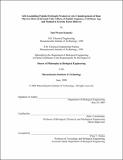Self-assembling peptide hydrogels promote in vitro chondrogenesis of bone marrow-derived stromal cells : effects of peptide sequence, cell donor age, and method of growth factor delivery
Author(s)
Kopesky, Paul Wayne
DownloadFull printable version (6.007Mb)
Other Contributors
Massachusetts Institute of Technology. Dept. of Biological Engineering.
Advisor
Alan J. Grodzinsky.
Terms of use
Metadata
Show full item recordAbstract
The inability of articular cartilage to heal after damage or disease has motivated investigation of novel cartilage tissue engineering technologies. The objective of this thesis was to advance the use of self-assembling peptide hydrogel scaffolds for cartilage repair by encapsulating bone-marrow-stromal cells (BMSCs) and incorporating chondrogenic cues to stimulate differentiation and neotissue production. To test the hypothesis that self-assembling peptide hydrogels provide cues which enhance the chondrogenic differentiation of BMSCs, a technique for rapid, high-viability BMSC encapsulation was developed. BMSCs were cultured in two peptide hydrogel sequences and compared to agarose hydrogels. BMSCs in all three hydrogels underwent TGF-3 1-mediated chondrogenesis as demonstrated by comparable gene expression and ECM biosynthesis. Cell proliferation occurred only in the peptide hydrogels, not in agarose, resulting in higher sulfated-glycosaminoglycan content and more spatially uniform proteoglycan and type II collagen deposition. These data showed that self-assembling peptide hydrogels enhance chondrogenesis compared to agarose. To evaluate the capacity for BMSCs from young and adult equine donors to produce cartilage-like ECM, neotissue formation was compared to that for animal-matched primary chondrocytes. Young chondrocytes stimulated by TGF-PlI accumulated ECM with higher sulfated-glycosaminoglycan content than adult chondrocytes and BMSCs of either age. BMSCs produced neotissue with higher dynamic stiffness than young chondrocytes. Measurement of aggrecan core-protein and chondroitin-sulfate length by atomic-force microscopy revealed BMSCs produce longer core protein and chondroitin-sulfate, and fewer catabolic-cleavage products than chondrocytes. Therefore, BMSC-produced aggrecan appears to have a younger phenotype than chondrocyte-produced aggrecan. These advantages make BMSCs a potentially superior cell source for peptide-hydrogel-based cartilage repair. To deliver TGF-pl to BMSCs via a bioactive scaffold, BMSCs were encapsulated in peptide hydrogels with both tethered and adsorbed TGF-p1 and cultured in TGF-p 1-free medium. Chondrogenesis was compared to that of unmodified peptide hydrogels with medium-delivered TGF-p1. Adsorbed-TGF-plI peptide hydrogels stimulated chondrogenesis of BMSCs as demonstrated by cell proliferation and cartilage-like ECM accumulation, while tethered TGF-p1 was not different from TGF-pl -free controls. TGF-p1 adsorbed to self-assembling peptide hydrogels can stimulate BMSC chondrogenesis. BMSC-seeded self-assembling peptide hydrogels, modified for controlled delivery of pro-chondrogenic factors, generate cartilage-like neotissue and are compatible with a single-surgery, autologous therapy for cartilage repair.
Description
Thesis (Ph. D.)--Massachusetts Institute of Technology, Dept. of Biological Engineering, 2009. Cataloged from PDF version of thesis. Includes bibliographical references (p. 108-115).
Date issued
2009Department
Massachusetts Institute of Technology. Department of Biological EngineeringPublisher
Massachusetts Institute of Technology
Keywords
Biological Engineering.